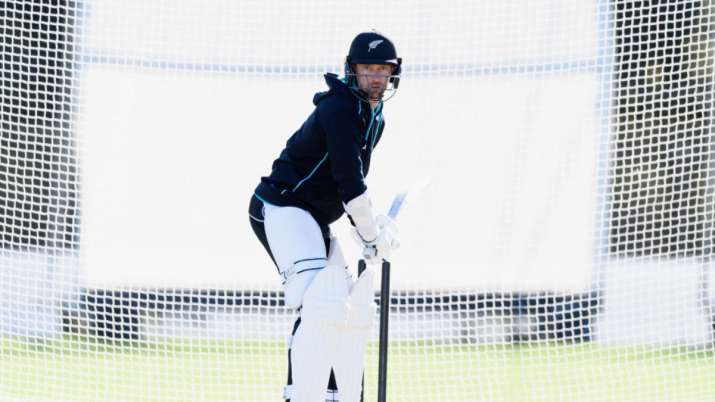How Devon Conway’s absurd off-season drills gear him up for the ultimate challenge
Devon Conway is currently the man of the moment for New Zealand, but there is more to the southpaw than just talent. Conway puts in strenuous efforts during the off-season, and his coach Glenn Pocknall takes us through the drills his ward goes through in order to attain excellence.

On a cold winter morning in Wellington last year, Devon Conway turned up for training full of energy, enthusiasm and curiosity, keen to put in the hard yards and become a better version of himself. What he wasn’t expecting that day, though, was for his coach Glenn Pocknall to banish him from training after delivering a mere 5 throwdowns.
Five minutes prior to the banishment, Conway had agreed with Pocknall that he’d be indulging in a match-simulation session, wherein he will stop batting if he gets out. It took Pocknall all of five balls to dismiss Conway, and so the southpaw stepped away from the nets, hoping to move on to the next drill. However, there was to be no kind words from his coach: Pocknall, rather politely, instead asked Conway to head back home.
“I told him, ‘No, Devon, you actually have to go home’ and he was very annoyed, very frustrated and his body language showed that he was disappointed and wanted to come and bat,” Pocknall tells SportsCafe.
And so, while evidently being disappointed and shocked, Conway headed back home that day. But Pocknall did not send Conway back home for no reason. The Wellington Firebirds coach reveals that the exercise was a part of a mental toughness regime, wherein he literally simulates in-game happenings where batsmen, at times, are required to spend hours (sometimes days) sitting inside the dressing after being dismissed early.
“We spend a lot of time indoors during the winter. So to try and develop some mental toughness, we replicate what is going to happen in a game. That prepares a player for the eventuality of what happens in a game - you’re disappointed that you’re out and you’ve got to sit in the changing room with your mates, you’ve got to go back to the hotel and you might not even get to bat in the next innings."
“So we were just trying to simulate the same. He went home that day, to his credit, and probably would have had nothing else to do that day in the middle of the off-season.”
Conway returned to training the next day, with the same energy and enthusiasm, but this time around he was a determined man with a solitary goal in mind - to bat for as long as he could.
“He came back the next day and I asked him (and a few others) if he wanted to do the same thing. Devon said straight away, ‘Yes, I want to do it. I’m not going to get out today.’”
And being a man of his word, Conway did exactly what he said - he refused to get dismissed. The southpaw batted continuously for no less than 60 minutes, and it got to a point where he physically tired out his coach. Eventually, Pocknall called off the drill but by then Conway had showcased his mental fortitude, turning the disappointment he faced the previous day into a success. This drill has since become a regular during the off-season, and Pocknall believes that it is an exercise that does wonders in sharpening the mental aspect of a player’s game.
“The main part of it is that it really develops players’ mental aptitude to bat in those challenging environments. A lot of people work on skill but don’t train the mind, but we decided to incorporate this in the off-season to develop players’ ability to cope with pressure,” Pocknall says.
But as Pocknall puts it, the aforementioned incident is a microcosm of Conway’s irreproachable attitude towards the game. The southpaw, after being dismissed on his fifth ball in the first day of training, came back and batted 60 minutes on day two, and Pocknall reveals that the 29-year-old incorporates the same attitude in matches, where he quickly puts disappointments behind and starts afresh with the goal of attaining success.
“He will take anything he can from an innings. Regardless of whether he’s been successful or not, he’ll take out the things he needs to become a better player and move on very quickly. That’s a very important trait to have as a high-performing cricketer because there are going to be a lot of times where you do not achieve what you want to achieve. So the ability to take one or two things out and move on very quickly is an important attribute to have.”
This match simulation, though, is just one of several interesting drills that Conway goes through in order to prepare himself for the rigours of international cricket. As revealed by himself last month, Conway uses kitty litter on practice pitches to hone his skills against the turning ball, and he also, apart from this, spices up net sessions through the usage of cones, paper cut-outs and nettings. Pocknall says that Conway is always keen to integrate foreign objects into net sessions as they raise the difficulty levels and test not just his skills, but also his mind.
“He’s always looking for a challenge. I think it’s the beauty of his success. Why he has had success is that he’s been in difficult scenarios - even in training scenarios he’s always looking to challenge himself and make things really hard. He thinks a little bit out of the box (with things like cat litter). We’ve tried to implement a lot of (weird) things in our training runs, especially in the winter because it becomes quite monotonous just indoors everyday."
“The surface is the same, it’s not variable, so we use different things like older balls, newer balls, scuffed-up balls, balls that have fallen apart, softer balls - lot’s of types of different balls to help prepare for what might happen in the game in different types of surfaces against different types of bowlers. We also sometimes use things like paper, cones and cut-out pieces of netting to help prepare against spinners.
“These things provide a distraction, but they also provide some variability in the surface which tests your skills firstly but tests you mentally too because you don’t know what the ball is going to do and you’ll have to be in the right frame of mind to be able to get through that challenge,” the Wellington Firebirds coach says.
These drills came to Conway’s rescue against England, where he dominated the English bowlers and finished as the series’ highest run-getter. But in three days’ time he will be up against the biggest challenge of his career, yet, playing in the World Test Championship final against arguably the best bowling attack in the world. Conway, for the Indian challenge, will understandably look to prepare intelligently, but Pocknall feels that the 29-year-old couldn’t have gotten better preparation than coming up against two all-time-greats in the lead-up to the final.
“Broad and Anderson are two of the best seamers in the world and you just have to look at their records for that - a combined tally of over 1,000 Test wickets. Coming up against those bowlers and exceeding expectations and performing very well against them is the best type of preparation one can get. India have a great attack and they’ll throw everything they have at him as well, they’ve got good balance in their attack with pace and swing, but facing the England bowlers in lead-up is the best preparation he could have gotten.”
Since Conway’s move to New Zealand, Pocknall has played a key part in the southpaw’s development as a cricketer, but the Wellington coach says that, currently, he is not passing any input to his ward as he just wants the Lord’s double-centurion to continue what he’s been doing.
“We exchanged a few messages and as you can imagine, he’s had thousands of messages.So he’s been very busy. I’ve tried to stay away as much as I can and just offer my support from afar because he’s doing so well and the key for him is just continuing what he’s doing.”
But mind you, Conway is not the only person who’s been overwhelmed with messages. Since SportsCafe first reached out to Pocknall, prior to Conway’s Test debut, the Wellington head coach has received over 30 media and interview requests, all thanks to the excellence of his ward. But as per his own admission, Pocknall has been enjoying these busy days as he simply does not want to pass up an opportunity to share stories about his protégé.
“I’m just so pleased for Devon; to see him succeed. It’s been interesting, taking calls in the middle of the night and messages in the middle of the night from the media all around the world. But it's a pretty cool story to share because of what Devon’s done and because of the person he is. So it’s been pretty amazing.”

Comments
Sign up or log in to your account to leave comments and reactions
0 Comments